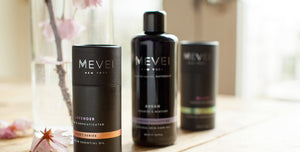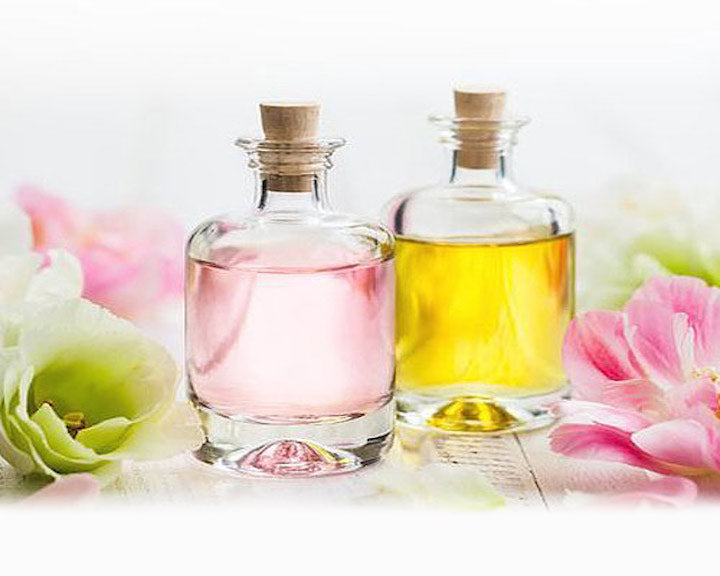Across the globe, the conversation about what goes into your favorite scents is becoming a passionate point of interest, with all-natural blends that are every bit as sophisticated as their synthetic counterparts arriving on shelves in droves.
The case against synthetic fragrances
The fragrance industry uses neurotoxic, carcinogenic and toxic chemicals derived from petroleum to make the sweet smelling fragrances. Whilst synthetic fragrances can smell amazing, it’s what you don’t know that might be causing you harm. Chemical aromas are used exclusively in almost all commercial fragrances, whether they be budget knock-offs or high-end niche perfumes.
Almost all of these are 100% synthetic, with a small number of high-end brands also including trace amounts of natural extracts, such as rose or jasmine, sometimes from plantations exclusive to that fragrance house. Nature-identical or reconstituted ingredients are also often included, which are chemically-created or adulterated ingredients designed to mimic the odor of natural extracts, but they are certainly not natural.
Whatever goes ON your skin goes IN your body. As you already know, the skin is the largest organ in the body, and over 60% of what you put on it is absorbed into your bloodstream, other organs and cells (e.g. pain patches, hormone therapy and nicotine patches). Don’t be fooled into thinking that what you spray on your skin won’t have an impact on your health.
What is really in synthetic fragrances?
Perfume is complex. Commonly, a perfume formula can include 15-50 different fragrant materials to make up an aroma, plus the base ingredient and any other additives that might be included.
For natural perfume, the ingredient list is simple: a combination of natural extracts for scent, natural alcohol or plant oil, water, possibly a natural antioxidant to maintain shelf life, and occasionally glycerine.
When is comes to synthetic fragrances the list of ingredients is vastly different.
Phthalates: Phthalates perform a few functions in synthetic perfumes. They can be included as part of a preservative system, and can be used to extend the fragrance so it lasts longer on the skin. Phthalates have been implicated in a number of wide-ranging health issues including certain cancers, asthma, breast cancer, obesity, male fertility issues and birth defects.
Parabens: In order to maintain a very long shelf life, synthetic preservatives are often included in commercial perfumes. The most common of these are parabens which effectively help stop bacteria and other contaminants from growing in your bottle of scent. It sounds like a good thing, but the impact of parabens on the human body is now well-documented. Parabens interfere with hormone function, especially that oestrogen, and may promote breast cancer development, and have an impact on sperm development in males. In addition, parabens are a common skin sensitiser and may cause other allergic reactions.
Other ingredients: Other ingredients often include artificial colour, UV absorbers, other preservatives, stabilisers such as BHT, ketones, VOCs and many others. Often, these are new ingredients that have not been proven safe for use on the skin or for human health generally. While reading the label on your perfume bottle is always a good idea and will give you a good indicator of how your perfume might affect your health, it is important to know that most commercial fragrances will only list around 50% of the total ingredients on their labels due to loopholes in the labelling laws. So if you read a label and it sounds like a list of chemicals you’d rather not apply, either contact the company to find out exactly what’s in that bottle, or look for a new fragrance that wont have a negative consequences for your health.
Why natural perfumes are better
Naturally-derived fragrance oils smell far better than cheap synthetic imitations. Whatever goes ON your skin goes IN your body. Natural perfumes don't contain dangerous synthetic chemicals. Fragrance chemicals are a serious environmental problem. Pollution from making, using and disposing of these chemicals hurts us all.
Just as your bare feet can tell the difference between walking on lush, cool grass and walking on Astro-turf, your body can tell the difference between real fragrances and synthetic ones. Real fragrances enhance your body's own unique, natural scent, and evoke powerful emotional responses from deep within. Synthetic fragrances can only mask and cover up your own natural scent. Only in recent times have perfumes been made from synthetic chemicals, which are quite dangerous to the wearer and everybody around them.
Natural perfumes are the original 'aromatherapy'. For thousands of years they have brought happiness and a sense of well-being to the fortunate ones who wear them.
In a truly natural perfume, organic essential oils will form the base of the fragrance; the only other ingredients you'll find are water and organic grain alcohol. The right scent for you should of course appeal to your specific tastes, but also consider why and when you wear your perfume. Different essential oils can affect your mind and mood in different ways, so you may want to choose a scent that can help you to relax, focus, wake up or simply pick up your spirits, depending on when and where you wear it.
Finding the right scent is important, but so is being able to wear it comfortably and confidently. Check the label closely for statements concerning the production of the perfume: does it plainly state that it was not tested on animals and contains no animal ingredients? While a product can be organic and natural without being vegetarian or vegan, a compassionate world view often goes hand-in-hand with an organic commitment when it comes to beauty products. The best perfume for you will mesh with your values as well as your sense of smell.
The other point to consider with natural perfume is that natural doesn’t necessarily mean plant-derived, although it may. These days, perfumes do not contain ingredients that require an animal to be killed to extract a scent (such as was the case with musk from deer in centuries gone by), but you may find some natural perfume will include ingredients such as ambergris (derived from sperm whale secretions), civet (from the anal secretions of the African civet), honey and beeswax.
If you are looking for a natural perfume that doesn’t include any animal ingredients at all, look for one that is vegan or labeled as containing only plant-based ingredients.
By knowing how to choose a truly natural perfume, you will be avoiding the potentially toxic effects of synthetic fragrance, such as headache, asthma, skin irritation and even hormone-related diseases. And you will be treating your senses to a fragrance that is more complex, and nuanced that anything created in a lab.
We fully understand and resonate with the dilemma that modern women face when deciding on fragrances to suit their personality. Our products in the SELECT SERIES and SIGNATURE BLENDS collection have a distinct personality of their own, and described as such in each product descriptions on our website to make it easier for our customers to decide what suits them best.
Many women use essential oils as an all natural alternative to fragrances. The benefits of essential oils extend far beyond aromatherapy; as a critical element of your daily beauty routine and skin care and we are trying to change that perception of essential oils from a therapeutic medicinal product to a splurge worthy, luxe beauty product that belongs on your dresser. Essential oils truly are sensuous, glamorous, indulgent and an essential component in every women’s beauty arsenal for an active lifestyle.
Below is a list of our products and their personality as an example.
|
ESSENTIAL OILS / FRAGRANCE |
PERSONALITY |
|
Bright, Cheerful, Alluring |
|
|
Stimulating, Fresh, Vibrant |
|
|
Spiritual, Serene, Meditative |
|
|
Iconic, Delicate, Chic |
|
|
Ambrosial, Magical, Extravagant |
|
|
Provocative, Sensual and Exotic |
|
|
Intense, Dramatic, Radiant |
|
|
Indulgent, Charming and Irresistible |
|
|
No-nonsense, Distinctive, Audacious |
|
|
Sensuous, Passionate, Voluptuous |
|
|
Alluring, Seductive, Intoxicatingly Feminine |



Comments
0 comments